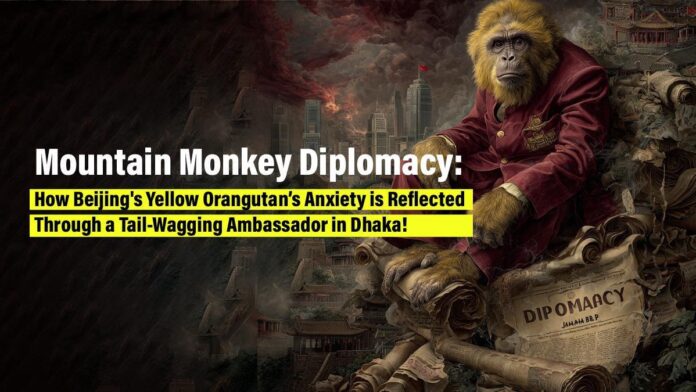
The recent comments by China’s ambassador—where he alleged that “the previous government obstructed BNP and Jamaat’s communications with China”—are not diplomatic observations. Rather, they reveal China’s direct political stance. These remarks are not only irrelevant but also signal a clear interference in Bangladesh’s internal political dynamics. This goes beyond the norms of diplomatic etiquette and dangerously questions the sovereign decision-making process of an independent state.
In the context of Bangladesh’s independence, democracy, and the legacy of war crimes, the position on Jamaat-e-Islami is clear. As a free nation, the people of Bangladesh have rejected the collaborators of 1971, and Jamaat and its ideology have never been accepted into the political mainstream. China may have ties with the BNP, but when it expresses dissatisfaction specifically regarding Jamaat, it raises the question—what values does China share with such a party?
Had China spoken from a position of ideological neutrality, it might have been understood. But this is a state that has been globally condemned for suppressing dissent, ethnic identity, and religious freedom. China’s so-called “re-education camps” have incarcerated millions of Uyghur Muslims, implementing a policy of cultural eradication. Muslim names, beards, religious practices—all have been banned under the guise of counterterrorism.
From military control over Tibet, suppression of Hong Kong’s pro-democracy activists, absolute censorship of the press, to pervasive digital surveillance of its own citizens—China is a country living under intense state control and fear.
In this context, when the Chinese ambassador expresses dissatisfaction over Bangladesh’s party politics, it’s clear he’s speaking with a confidence that comes not just from Beijing’s foreign ministry. Rather, it is nourished by the semi-authoritarian, China-dependent, unrepresentative political structure that currently exists within Bangladesh.
It’s no secret in diplomatic circles that China is not only interested in future political rearrangements but also actively involved in constructing and stabilizing the current regime. When Yunus seized power in 2024 through the July riots and China rushed to extend recognition, support, and announce investments behind this illegitimate government—it wasn’t surprising, but it was certainly telling. Now that the regime is facing both internal and public legitimacy crises, China’s provocative statements further clarify who is “supporting” whom, and who is providing “backup” to whom.
In this light, the ambassador’s comments are not only concerning—they mock the very notion of a transparent internal political process. If China truly desires a friendship with Bangladesh, it must be founded on the language of diplomacy and mutual respect—not through ideological proxy politics.
There must be a clear boundary: whether China or any other country, the question of internal political processes—especially concerning engagement with banned or controversial parties in light of democracy and the history of war crimes—is entirely a sovereign matter. There is no scope for any foreign state to express “dissatisfaction.” Such remarks are not only inappropriate but also violate the norms of foreign policy and diplomatic courtesy.
A friendly relationship with China does not mean surrender. And if the ambassador’s voice dares to insult the soil, history, and values of this country, then that should not be seen as “friendship,” but rather taken as a warning sign.




